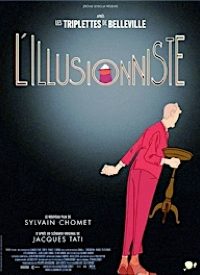
If you prefer the charm of hand-drawn animation to the computer-generated sort, you’ll love The Illusionist. The primary character, an aging and outdated European magician named Tatischeff, plays one-night gigs traveling from town to town and country to country, often being cheated by his employers. Eventually he crosses paths with Alice, a teenager who plays at being grownup, and who believes him to be the magician he once was. Their ensuing adventure together is both humorous and haunting. The movie is enchantingly slow-paced, and the animation and sound styles create a nearly perfect stage for this character-driven story.
Not to be confused with the 2006 movie of the same name starring Edward Norton, this little jewel had very different beginnings. French filmmaker Jacques Tati, voted 46th of the Greatest Movie Directors of all time by Entertainment Weekly, wrote the script for The Illusionist in the late 1950s as a love letter from a father to his daughter, though he never made the movie. Eventually award-winning writer and director Sylvain Chomet acquired it with permission from Tati’s estate, deciding that animation was the best way to tell the tale.
This period piece, about the inevitable passage of time, is a delightful bit of film work.
When Tatischeff ends up in a small Scottish village performing at a country pub, he meets Alice, and they travel together to Edinburgh. Alice is genuinely star-struck with the big city, and the setting transforms her from a girl to a young woman. Tatischeff begins to augment his magician’s income with part-time night jobs, which he conceals from Alice, to be able to purchase the grownup shoes and dresses she longs for in store windows. But eventually she attracts a suitor and moves on. The illusionist is disillusioned, and upon finding that Alice has chosen another life, he travels to the next town, leaving a note for her about the reality of magicians.
Because of the movie’s curious lack of dialogue, the viewer is required to invest himself in the characters to try to understand them. The few words that are included in the movie don’t convey information, but seem to blend with the music to become just more background noises.
>
The animation, free of superfluous details, captures the color and movement of the hand-drawn variety while engagng the viewer’s attention with the characters, from big-city residents to back-country barkeeps — even to the magician’s stage rabbit.
But there is one caution for parents: The film is not a family entertainment piece. Even though the relationship between Tatischeff and Alice is one of father/daughter, the mature theme of an older man accepting a young girl he does not know as his traveling companion disturbed this reviewer. Though there is not a hint of impropriety, younger viewers still could be confused by this theme.
And it is a sad tale of the realities of life. But as a work of art and a poignant, well-told story, it is time well spent.



